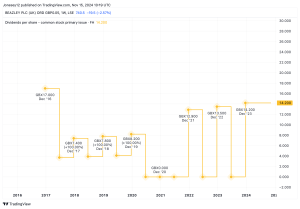The Unilever (LSE:ULVR) share price outperformed the index on Thursday (25 July) despite undershooting forecasts in the first half of the year.
Investors found positives within the earnings report, including margin expansion and a continuation of the company’s share buyback programme. Let’s take a closer look.
Unilever’s mixed H1
Unilever’s second-quarter sales growth of 3.9% fell short of the expected 4.2%, as the company struggled to attract inflation-weary consumers despite lowering prices.
The maker of Magnum ice cream and Dove soap increased prices by only 1%. That was below the anticipated 1.6%.
This reflects a broader trend among consumer goods companies, including Nestlé — whose stock slumped on Thursday — which are relying on discounts and promotions to boost sales volumes following the cost-of-living crisis.
The company also noted a fallout from the Gaza conflict, with many Muslims — notably those in Indonesia and Malaysia — electing to avoid multinational brands.
However, despite challenges, including geopolitical impacts in Indonesia and weak consumer confidence in China, Unilever maintained its 3-5% annual sales growth outlook and expects an underlying operating margin of at least 18%, surpassing expectations.
Moreover, Unilever’s undergoing a major turnaround, including separating its ice cream business and cutting about a third of European office roles by the end of next year.
The company also raised its quarterly dividend by 3% and launch a €1.5bn share buyback programme.
What does all this mean?
Despite rising over the past year, and notably after the 25 July earnings report, the stock’s long-term performance is rather poor. The stock’s down 5% over five years.
However, it’s certainly positive to see margin expansion and the continuation of the share buyback programme. These factors suggest that Unilever’s focusing on shareholder returns while navigating a challenging market environment.
The company’s ability to maintain its annual sales growth outlook despite headwinds is also encouraging. It indicates that management has confidence in its strategic initiatives and the underlying strength of its diverse brand portfolio.
Furthermore, the ongoing restructuring efforts, including the separation of the ice cream business and job cuts, demonstrate Unilever’s commitment to streamlining operations and improving efficiency.
The company had been widely criticised by investors for some time for not prioritising earnings, and occasionally being “too woke”.
The bottom line
Unilever’s actually among the most expensive FTSE 100 stocks. The company currently trades at 20.5 times forward earnings, putting it at a considerable premium to the average.
This figure then falls to 19.2 times for 2025 and 18.2 times for 2026, based on projected earnings. That actually looks a little expensive, and the 3.5% dividend yield doesn’t convince me the stock should be on my radar.
However, we shouldn’t ignore the power of efficiency drives. The stock’s underperformed primarily because investors didn’t think the company was focused enough on driving profitability. That could be due to change.
This post was originally published on Motley Fool







